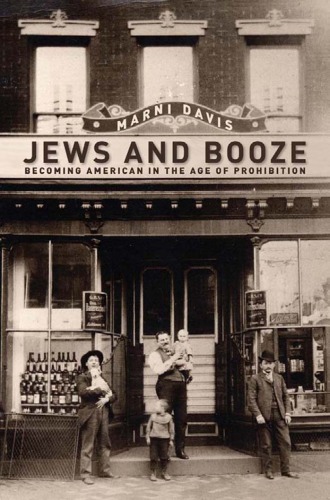
Jews and Booze
Becoming American in the Age of Prohibition
فرمت کتاب
ebook
تاریخ انتشار
2012
نویسنده
Жоффруа де Виллардуэнنویسنده
Jack Goldsteinنویسنده
Жоффруа де Виллардуэнنویسنده
Jack Goldsteinنویسنده
Marni Davisناشر
NYU Pressشابک
9780814744093
کتاب های مرتبط
- اطلاعات
- نقد و بررسی
- دیدگاه کاربران
نقد و بررسی

November 14, 2011
In a provocative study of Jews’ complicated relationship to alcohol and Prohibition in American history, Georgia State assistant history professor Davis records that as early as the 1870s, American religious, cultural, and business issues created debates within the Jewish community: many Jews saw the temperance and prohibition movements as a mission to impose white Protestant values on American politics and culture. But, says Davis, Jews also had a financial interest in the liquor trade, having long been distillers, wholesalers, and liquor store owners. The 18th Amendment did have some Jewish supporters, notably Prohibition agent Izzy Einstein, a “flamboyantly ethnic” A Jewish immigrant and nationally renowned Prohibition agent who prosecuted fellow Jews with “irrepressible gusto.” Social justice advocate Rabbi Stephen Wise and the progressive governors of Idaho and Utah believed liquor traffic corrupted politics and that saloons added to the demoralization and impoverishment of the working class. The Volstead Act’s sacramental wine dispensation led to debates about assimilation versus seeking special rights for Jewish historical continuity And there were fears that Jewish bootlegging—which, though it represented only a fraction of the business, tainted American Jewry’s reputation and exacerbated anti-Semitism. Unfortunately, stilted prose undermines Davis’s provocative, well-researched, and potentially intriguing study. Photos.

October 15, 2011
In her debut, Davis (History/Georgia State Univ.) suggests that anti-Semitism and Prohibition were parallel expressions of political disquiet during the turn of the last century. As the nation's fifth-largest industry, alcohol was an important source of public revenue. The author cites statistics showing the explosive growth of retail liquor dealers: 90,000 in 1865, 175,000 in 1880 and nearly 200,000 in 1900. The industry offered an important niche for Jews from Central Europe who had practiced the trade in the old country and provided them a pathway for admission into American society despite obstacles such as the tie-ins between brewers and saloons. Davis describes the social networks and community relationships established by this early wave of American Jews who became leaders in their broader communities, practiced Reform Judaism while maintaining their ethnic and religious roots, and favored assimilation. While they supported moderation in the use of alcohol, they did not support Prohibition. "The anti-alcohol movement," writes the author, "absorbed and tapped into populist anxieties about the concentration of capital and exploitation of labor and consumers." She describes this as scapegoating immigrants who were blamed for the "increasingly urban and commercial nature of the American economy," and it spawned anti-Semitic rhetoric, which painted "Jews as an alien and malevolent force in the American economy" that turned the drunken lower classes into their political pawns. Davis touches on strains within the Jewish community as later waves of Eastern European Jews rejected the religious liberalism of their Jewish predecessors. With Prohibition, most Jews left the industry, but bootleggers like the Bronfman family became wealthy and were accepted into high society, and the mafia flourished--led by Al Capone, "Lucky" Luciano, Meyer Lansky and others. A fascinating, nuanced social history.
(COPYRIGHT (2011) KIRKUS REVIEWS/NIELSEN BUSINESS MEDIA, INC. ALL RIGHTS RESERVED.)

November 15, 2011
Davis (history, Georgia State Univ.) takes readers through the second and third waves of European Jewish U.S. immigration, starting in the late 19th century, when the temperance movement was gaining force toward passage of the 18th Amendment to make illegal the production and sale of alcohol. She writes that the era's national debates about alcohol shaped how Jewish Americans understood and articulated their American and Jewish identities. Maintaining their historic ties to alcohol, many Jewish immigrants continued to produce and sell liquor in the United States, but the national discourse about alcohol changed as white Protestant Americans increasingly felt their influence being eroded by the influx of immigrants. Initially considered temperate and "respectable," the Jewish immigrants came to be seen as a corrupting and exploitative force because of their involvement in the liquor industry pre-Prohibition. Using census data and other primary documents, Davis brings to life the stories of Jewish saloon keepers, rabbis, and alcohol producers faced with the temperance movement and increased anti-Semitism. VERDICT While much has been written about the temperance movement and Prohibition, Davis focuses uniquely on the implications and impact of this period on one ethnic and religious population. Recommended to readers studying aspects of turn-of-the-century immigration or temperance, Prohibition, or Jewish studies.--Karen Okamoto, John Jay Coll. Lib., CUNY
Copyright 2011 Library Journal, LLC Used with permission.

























دیدگاه کاربران